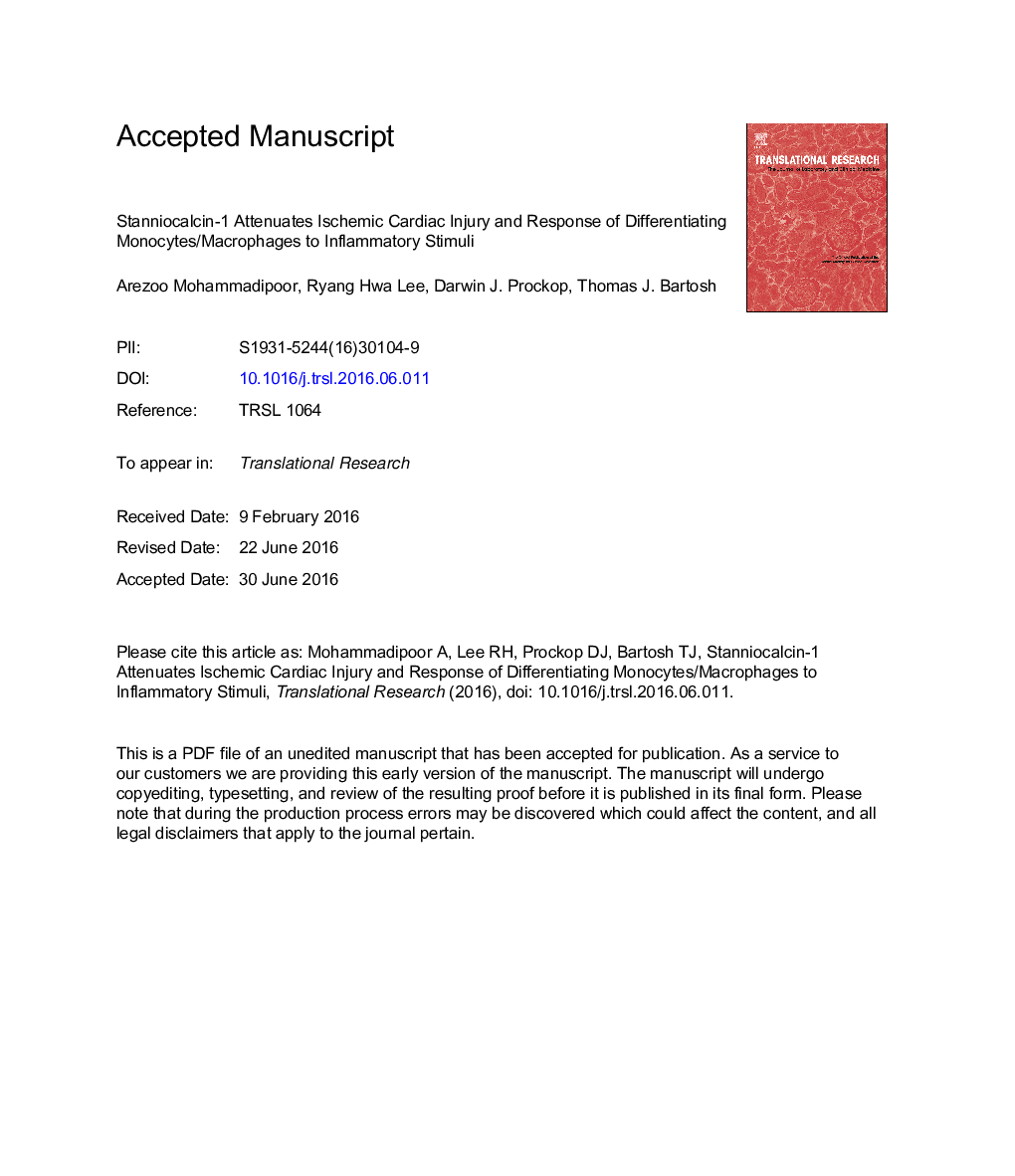| کد مقاله | کد نشریه | سال انتشار | مقاله انگلیسی | نسخه تمام متن |
|---|---|---|---|---|
| 5685138 | 1597933 | 2016 | 43 صفحه PDF | دانلود رایگان |
عنوان انگلیسی مقاله ISI
Stanniocalcin-1 attenuates ischemic cardiac injury and response of differentiating monocytes/macrophages to inflammatory stimuli
دانلود مقاله + سفارش ترجمه
دانلود مقاله ISI انگلیسی
رایگان برای ایرانیان
کلمات کلیدی
TNFTLRPAMPPKCATCCdeoxyribonucleaseRPMIMSCRT-PCRHMGB1DAMPGAPDHNIHchemokine (C-X-C motif) ligand 2mRNALVEFphorbol 12-myristate 13-acetateSTC-1FBSCXCL2LPSStanniocalcin-1PBScDNA - cDNAMPO - DFODNAse - DNAasePMA - LDC هاNOD/SCID - NOD / SCIDUCPs - UCP هاCritical threshold - آستانه انتقادیcomplementary deoxyribonucleic acid - اسید دز اکسید ریبونوکلئیک مکملribonucleic acid - اسید ریبونوکلئیکRNA - اسید ریبونوکلئیکdamage-associated molecular pattern - الگوی مولکولی مرتبط با آسیبpathogen-associated molecular pattern - الگوی مولکولی وابسته به پاتوژنinterleukin - اینترلوکینCardiac output - برون ده قلبیanalysis of variance - تحلیل واریانسANOVA - تحلیل واریانس Analysis of varianceELISA - تست الیزاEnzyme-linked immunosorbent assay - تست الیزاToll-like receptor - تیالآرUncoupling proteins - جدا کردن پروتئین هاIntravenous - داخل وریدیdiastolic - دیاستولیکmessenger ribonucleic acid - رسوب ریبونوکلئیک اسیدreverse transcription - رونویسی معکوسfetal bovine serum - سرم جنین گاوMesenchymal stem cells - سلول های بنیادی مزانشیمیSystolic - سیستولیکConditioned medium - شرایط محیطیtumor necrosis factor - فاکتور نکروز تومورLAD - لادوlipopolysaccharide - لیپوپلی ساکاریدNational Institutes of Health - مؤسسات ملی بهداشتRoswell Park Memorial Institute - مؤسسه یادبود پارک RoswellAmerican Type Culture Collection - مجموعه فرهنگی نوع آمریکاییPhosphate-buffered saline - محلول نمک فسفات با خاصیت بافریrelative quantity - مقدار نسبیmyeloperoxidase - میلوپراکسیداز polymerase chain reaction - واکنش زنجیره ای پلیمرازreverse transcription polymerase chain reaction - واکنش زنجیره ای پلیمراز رونویسی معکوسPCR - واکنش زنجیرهٔ پلیمرازHigh mobility group box 1 protein - پروتئین جعبه 1 پروتئین گروه تحرکProtein kinase C - پروتئین کیناز سیleft anterior descending - چپ قدامی نزولیLeft ventricle ejection fraction - کسر خروجی بطن چپfractional shortening - کوتاه کردن کسریglyceraldehyde 3-phosphate dehydrogenase - گلیسرولیدید 3-فسفات دهیدروژناز
موضوعات مرتبط
علوم پزشکی و سلامت
پزشکی و دندانپزشکی
پزشکی و دندانپزشکی (عمومی)
پیش نمایش صفحه اول مقاله

چکیده انگلیسی
Stanniocalcin-1 (STC-1) is a multifunctional glycoprotein with antioxidant and anti-inflammatory properties. Ischemic myocardial necrosis generates “danger” signals that perpetuate detrimental inflammatory reactions often involving monocyte recruitment and their subsequent differentiation into proinflammatory macrophages. Therefore, we evaluated the effects of recombinant STC-1 (rSTC-1) on monocyte phenotype and in a mouse model of myocardial infarction. Using an established protocol to differentiate human monocytes into macrophages, we demonstrated that rSTC-1 did not alter morphology of the differentiated cells, toll-like receptor (TLR) 4 expression, or expression of the myeloid cell marker CD11b. However, rSTC-1 treatment before differentiation attenuated the rise in the expression of CD14, a TLR4 coreceptor and pathogen sensor that propagates innate immune responses, and suppressed levels of inflammatory cytokines produced by the differentiated cells in response to the CD14-TLR4 ligand lipopolysaccharide. Moreover, rSTC-1 treatment reduced CD14 expression in monocytes stimulated with endogenous danger signals. Interestingly, the effects of rSTC-1 on CD14 expression were not reproduced by a superoxide dismutase mimetic. In mice with induced myocardial infarcts, intravenous administration of rSTC-1 decreased CD14 expression in the heart as well as levels of tumor necrosis factor alpha, C-X-C motif ligand 2, interleukin 1 beta, and myeloperoxidase. It also suppressed the formation of scar tissue while enhancing cardiac function. The data suggests that one of the beneficial effects of STC-1 might be attributed to suppression of CD14 on recruited monocytes and macrophages that limits their inflammatory response. STC-1 may be a promising therapy to protect the heart and other tissues from ischemic injury.
ناشر
Database: Elsevier - ScienceDirect (ساینس دایرکت)
Journal: Translational Research - Volume 177, November 2016, Pages 127-142
Journal: Translational Research - Volume 177, November 2016, Pages 127-142
نویسندگان
Arezoo Mohammadipoor, Ryang Hwa Lee, Darwin J. Prockop, Thomas J. Bartosh,